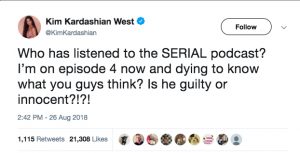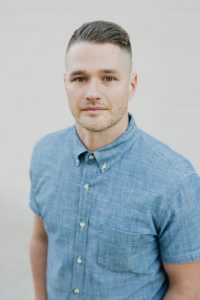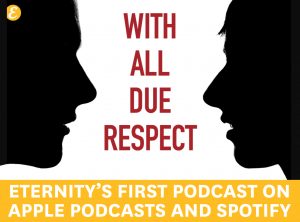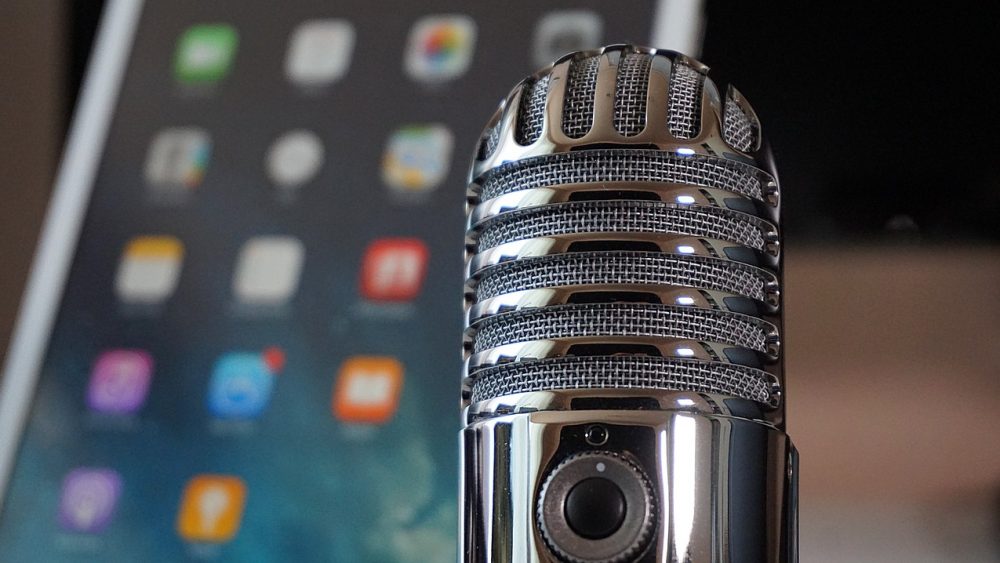Podcasting is the new black
Top tips from veteran show Newsworthy with Norsworthy
In case you hadn’t noticed, podcasting is so hot right now – especially among Christians.
Not only are there lots of new podcasts cropping, there’s a stack of older ones that if you haven’t listened to already, you should catch upon. Just ask Kim Kardashian, who recently became an object of ridicule when she tweeted, “Who has listened to the SERIAL podcast? I’m on episode 4 now and dying to know what you guys think? Is he guilty or innocent?!?!” – about the Serial podcast that became an international sensation … in 2014.

Remember how video killed the radio star? And then music streaming killed the music label? Well, there’s currently more than 555,000 podcast shows available on Apple and over 525,000 of them are active. Shows. Between them, they’ve produced over 18.5 million podcast episodes in more than 100 languages.
And it’s growing – which is a big deal, given reports that social media consumption dropped by 4 per cent last year and audiobook listening plateaued.
Every three months since the beginning of 2014, US company Edison Research has surveyed approximately 5,500 people over the age of 12, to collate the country’s only ‘share of ear’ report. Those surveyed keep a 24-hour diary, recording their audio listening for each 15 minute interval.
The total amount of time spent listening to audio has remained static – with the average person listening to around 4 hours of audio per day. However, what people are listening to, along with how they listen to it, has changed significantly. Podcasts’ ‘share of ear’ has doubled in the last four years.
This year, Edison Research found 44 per cent of the people over 12 years of age have listened to a podcast and 26 per cent have listened to one in the last month. And although podcasting only accounts for 4 per cent of the total share of ear (compared with 50 per cent share spent listening to AM/FM radio and 16 per cent spent on streamed audio, like Spotify), this growth, when the total share of ear hasn’t increased, is a significant creep.
Furthermore, Edison Research found that once someone becomes a podcast listener, they’re hooked and it becomes the main auditory content they listen to at 33 per cent (with radio dropping to 25 per cent, owned music dropping to 15 per cent and streamed music going to 14 per cent).
Tips from veteran podcaster Luke Norsworthy

With so many podcasts on offer, Eternity turned to veteran Christian podcaster Luke Norsworthy, of Newsworthy with Norsworthy, who has more than three hundred episodes under his belt. He has interviewed most of the well-known names in Christianity today, including N.T. Wright, Rob Bell, Walter Brueggemann, Greg Boyd, Sarah Bessey, Bob Goff, Miroslav Volf, Rachel Held Evans, Richard Rohr, Scot McKnight and Barbara Brown Taylor.
Norsworthy says that five years ago, when he’d have a well-known guest on his podcast, he’d see an immediate spike in his listeners, but these days there’s no discernible change. He thinks that’s because when he started, if people were searching for content by Christian thinkers, there were only so many places to find it. Now, there’s many. But unlike many podcasters today, Norsworthy’s goal was never to build a brand or to build a platform, or to achieve celebrity status himself.
“The weird thing about celebrity is that if you’re around someone who’s a celebrity enough, then people start to think you’re one.”
Norsworthy says that he can see why people would be tempted to produce a podcast for those reasons, but that wasn’t his motivation. Instead he started when he was a church planter and had “no idea” and a “crappy USB microphone”.
“I’m doing this really because I want to learn from these people.” – Luke Norsworthy
“The impetus for my podcast was ‘these are people who are helping me make sense of my faith’, so the Richard Rohrs, the N.T. Wrights, those are naturally the people that I’m going to want to gravitate towards. Barbara Bradford Taylor has helped me a lot. Rob Bell has been helpful for me. Walter Brueggemann. So these are people I would go out of my way to get to know.”
“But I’m kinda on the other side now where publishers send me books,” he says, explaining that he receives ten to twelve books a month because “people understand now that this is free publicity for authors so they’re sending me stuff”.
In the sea of Christian interview podcasts episodes that now exist, Norsworthy’s are still striking for the simple reason he’s a brilliant conversationalist – a skill he credits to his dad.
“My dad’s a psychologist, so I’ve had that in my, like, DNA. And I feel like there’s part of that that goes into it. I’m not saying like I’m doing psychoanalysis on people, but my Dad has modelled for me how to ask follow up questions, how to look into people.”
“I would like to think that every person I have on, I’m seeking not to do this ‘gotcha’ journalism where I catch them in a question and turn on them so I get clickbait. But I’m doing this really because I want to learn from these people I respect. For me, it’s more about my own personal curiosity and so maybe the sense of connection is … genuine – that I’m genuinely trying to learn and to gain something from each person I talk to.”
Part of Norsworthy’s charm is he resists the urge to attempt to impress his guest or his listeners, despite being well studied, and instead asks questions the listener are wondering.
“Part of that is that I’m a pastor. Part of the difference between an academic and a pastor is that I need to communicate at a 7th or 8th grade level as a pastor. That’s important to make it accessible to everyone. I don’t always do that on the podcast, sometimes I nerd out and go a few grades up, but I want to make it accessible to jump in and learn some foundational stuff.
“But yeah, I’m not trying to show people how smart I am. At least I hope I’m not.”
“I thought, ‘If I’m in front of the guy who I think is the most prominent living theologian [N.T. Wright and I can survive that with no notes and no prep, then it’s going to be OK’,” laughs Norsworthy.
Any anxieties Norsworthy might have had at the beginning were overcome when his friend Tripp Fuller – who also began podcasting early on – threw him in the proverbial deep end, late one night on a stage at a conference, unexpectedly getting him to facilitate a panel including N.T. Wright.
“I thought, ‘If I’m in front of the guy who I think is the most prominent living theologian and I can survive that with no notes and no prep, then it’s going to be OK’,” laughs Norsworthy.
Asked if he has any tips to share about how he makes his podcast guests feel relaxed, he explains that when he finds that he’s comfortable, relaxed and not anxious or nervous, there’s a good chance his guests reciprocate.
“If I don’t take myself too seriously and if I’m willing to be honest and fully engage – even in things I don’t understand or that are above me – I feel like people are themselves more comfortable and can reciprocate that kind of honest human connection.”
Norsworthy’s often the first person to make the conversation more personal or to point out a contradiction in his thinking and says this is something he particularly does with guests who do a lot of interviews because he doesn’t “want to bore them”.
“I don’t want to make them go through the same thing every time,” he tells me “Like ‘Oh hey, Joel [Houston], it’s like a rock concert here, why do you guys have so many lights?’ I want to get around that.”
“Podcasting is more… unbuttoned – this isn’t like you’re your suit and tie, Sunday morning, perfected, well-crafted stuff.” – Luke Norsworthy
Asked whether he thinks podcasting is a form of communication especially suited to the current generation, Norsworthy hesitates: “So I communicate three ways – podcast, writing and then, preaching, which is my main one. And I really like preaching. I like all three of them” before continuing,
“What I think podcasting does – in theory – is that it’s conversational. It is more… unbuttoned – this isn’t like you’re your suit and tie, Sunday morning, perfected, well-crafted stuff. I mean, it’s people that are cutting it up and – before my current president destroyed the term – it’s the ‘locker room talk’. [But] Not like Trump locker room talk.
“Like… we’re just trying to be more authentic. It’s just two people who are just having a conversation. There are microphones in front of us and sure, that makes it a little awkward, but hopefully it’s not polished.”
Norsworthy doesn’t have any staff who help on his podcast, and he says it only takes him around 45 minutes a podcast once the recording is done, to edit and get it online.

You can listen to the first episode of With All Due Respect now – subscribe via Apple Podcasts, Spotify Eternity
“I hardly do any editing. Like, I’ve probably edited two or three comments out of 300 off the podcast because someone said “hey, I mentioned someone’s name or overstepped…” he says.
And that’s the way he likes it, with his guests not coming off as “smooth and shiny” but where “the imperfections … the rough edges” that people can connect with are apparent.
“Some people want God to be very imminent and others want God to be very transcendent,” he muses.
“I get that God is both, but the immanence, the incarnation – that God became flesh and dwelt among us – that’s the most beautiful part of the story for me, so I want every part of my art to do that.”
Podcasts to check out
Newsworthy with Norsworthy – (Click here for Luke’s all time favourite episode)
With All Due Respect Megan Powell du Toit and Michael Jensen
Inverse Podcast – Jarrod McKenna and David Andrew
Feedback
Tell us your favourite podcast






